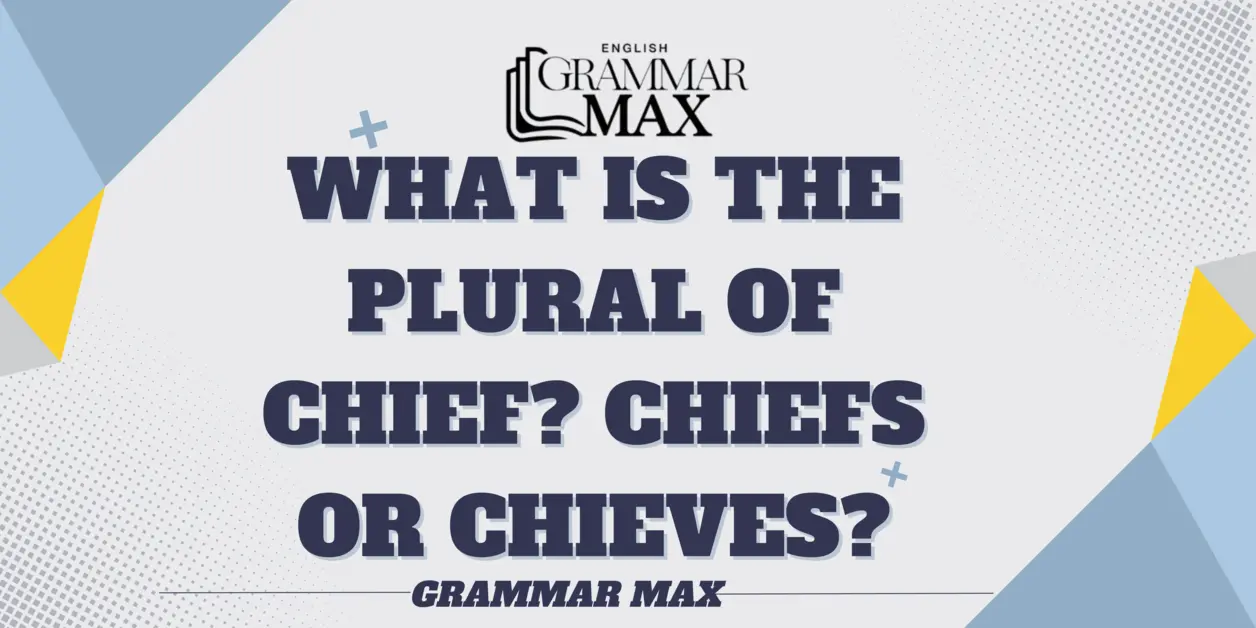Ever wondered what the plural of the chief is? You’re not alone! Words in English can sometimes be tricky, especially when it comes to making them plural. For chief, the correct plural form is chiefs, not chieves. Chieves is just a wrong word nothing else.
This article will break down why we add an “s” instead of changing the ending to “-ves,” so you’ll know exactly how to use chief and chiefs the right way. Let’s dive in and make it easy to remember!
What does Chieve Mean?
The word “chieve” isn’t standard in English and doesn’t have a recognized meaning. However, it might appear as a misspelling of *achieve*, which means to accomplish or successfully reach a goal.
Sometimes, people mistakenly use “chieves” instead of the correct plural form of a chief, which is chiefs. Remember, chief pluralizes by simply adding an “s,” making ‘’chiefs’’ the correct form.
What Does “Chief” Mean?
The term chief generally refers to someone in a position of authority or leadership, such as a chief executive officer (CEO) or a police chief. It can also signify the primary or most important part of something, like “the chief reason” or “chief concern.” The word holds a place of importance in many fields, from the corporate world to community leadership, and even within families and organizations where there’s a need for guidance or direction.
Chief: Singular and Plural Usage
Using chief in both its singular and plural forms is straightforward:
- Singular: Refers to one leader or primary person in charge, as in “The chief led the meeting.”
- Plural (Chiefs): Refers to multiple leaders or people in charge, as in “The chiefs from various departments discussed their annual strategies.”
The simplicity here lies in the fact that English doesn’t complicate the plural form of chief. This word doesn’t alter its base form in the plural, so it simply becomes chiefs, not chieves.
Why is the Plural of “Chief” Not “Chieves”?
English pluralization rules can seem inconsistent, but there’s a method to the madness. For most words ending in “-f” or “-fe,” we do indeed change the ending to “-ves” when pluralizing, as with wife to wives or leaf to leaves. However, the chief is an exception due to its unique sound pattern and historical linguistic roots. Words with endings like “-ief” (such as belief) usually just take an “-s” to form the plural. This consistency in sound patterns is one reason we say chiefs rather than chieves.
Examples of Singular and Plural Usage in Sentences
Singular Usage:
- “The police chief implemented a new strategy to improve safety.”
- “Our team appreciates the hard work of our chief in guiding us.”
- “The village’s chief is known for wise decision-making.”
Plural Usage:
- “The CEOs and department chiefs presented their plans for the coming year.”
- “Military chiefs from allied nations discussed cooperative efforts.”
Origin of “Chief”
The word chief has an interesting history, originating from the Old French term chef, which means “head” or “leader.” This, in turn, traces back to the Latin word caput, also meaning “head.” By the Middle Ages, chief found its way into Middle English, keeping the same essential meaning we use today whether in government, business, or community leadership, chief designates someone at the top.
Synonyms for “Chief”
If you want to vary your vocabulary, here are some synonyms that carry a similar meaning to chief:
- Leader
- Head
- Boss
- Principal
- Director
- Commander
- Supervisor
- Captain
These alternatives can help diversify your language, especially in contexts involving multiple leaders or department heads.
Quick Reference Table: Chief and Other Pluralization Examples
| Word | Singular | Plural |
| Chief | Chief | Chiefs |
| Leaf | Leaf | Leaves |
| Belief | Belief | Beliefs |
| Knife | Knife | Knives |
Frequently Asked Questions
What is the correct plural of “chief”?
The correct plural of chief is chiefs. Unlike some words ending in “-f,” chief does not change to “-ves” in the plural.
Why isn’t the plural of “chief” spelled as “chieves”?
The plural of chief is chiefs because, in English, words with “-ief” endings (like chief and belief) typically add an “-s” rather than changing to “-ves.”
Can “chief” be used to describe things other than people?
Yes! Chief can also mean the most important part of something, such as “the chief reason” or “chief concern.”
Are there any exceptions to the “-s” rule for plurals?
Yes, there are. English has several exceptions where words ending in “-f” change to “-ves” in the plural, like leaf (leaves) and wolf (wolves). However, chief is not one of these exceptions.
Conclusion
the plural of “chief” is “chiefs,” not “chieves.” While English has plenty of exceptions with “-f” ending words turning to “-ves” in the plural, the chief doesn’t follow this rule. It simply adds an “-s,” making “chiefs” the correct form. Whether you’re referring to leaders, heads of departments, or any other authority figures, remember to use “chiefs” for the plural form. This straightforward rule will help keep your language clear and accurate when discussing multiple chiefs.

William Henry is a writer for Grammar Max, a blog that focuses on synonyms and phrases. He loves exploring the quirks of the English language and enjoys helping readers improve their vocabulary. William’s articles are easy to read, fun, and full of useful tips for anyone looking to better understand and use English. Whether you’re a student, a professional, or just someone interested in language, William’s writing on Grammar Max makes learning about words and their meanings simple and enjoyable.
